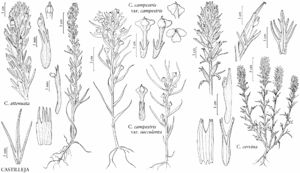Castilleja cervina
Bot. Gaz. 25: 269. 1898. (as Castilleia)
Herbs, perennial, (2.3–)3–8 dm; from a woody caudex; with a taproot. Stems solitary or few to many, erect, branched distally, sometimes unbranched or with short, leafy branches in axils of leaves, glabrous, sometimes hairy, hairs moderately dense, spreading, short, soft, eglandular. Leaves green, sometimes purplish, linear or narrowly lanceolate, 1–9 cm, not fleshy, margins plane, involute, 3–5(–9)-lobed, apex acuminate to narrowly acute; lobes spreading, linear, arising near or below mid length, apex acute, rarely obtuse. Inflorescences 3–15(–20) × 1.5–3 cm; bracts proximally pale greenish to pale yellowish green, distally white, cream, or pale yellow, sometimes pale greenish, pale yellow-green, or pale yellow throughout, lanceolate to narrowly elliptic, 3–5(–7)-lobed; lobes ascending or spreading, linear to very narrowly linear, long, arising above or below mid length, apex acute to obtuse. Calyces green, rarely pale purple, lobes white, cream, or pale yellow, 18–24(–27) mm; abaxial clefts (6–)8–16 mm, adaxial 4–10(–14) mm, abaxial 45–60% of calyx length, adaxial 15–40% of calyx length, deeper than laterals, lateral 1–4 mm, 5–15% of calyx length; lobes narrowly triangular to linear, apex acute. Corollas straight or ± curved, 16–25 mm; tube 15–17 mm; beak exserted from calyx, adaxially green, 5–7 mm; abaxial lip deep green, reduced, exserted through abaxial cleft, 1–4 mm, 40–60% as long as beak; teeth erect, white, 0.5–1 mm. 2n = 24.
Phenology: Flowering (May–)Jun–Jul.
Habitat: Open pine forests and grasslands, rocky balds and dry subalpine meadows.
Elevation: 500–2000 m.
Distribution
B.C., Idaho, Wash.
Discussion
Castilleja cervina is found across northern Washington, from the eastern slope of the Cascade Range, east to northern Idaho and north to southern British Columbia. Plants at higher elevations are dwarfed. Reports from Montana need verification.
Selected References
None.
